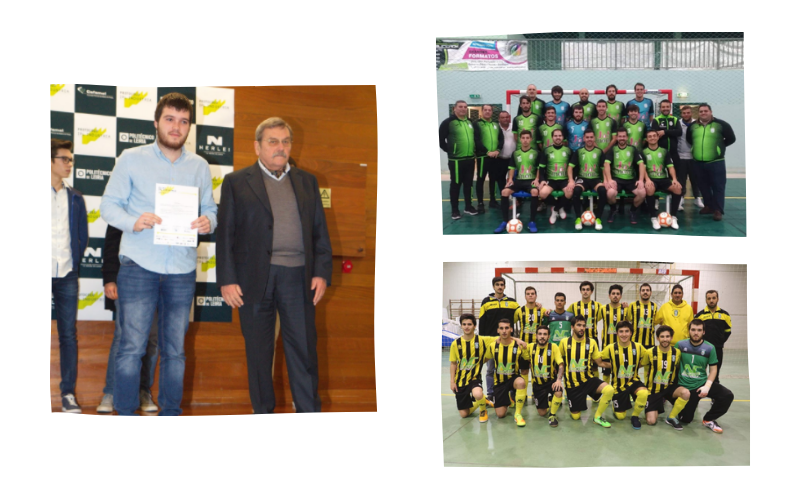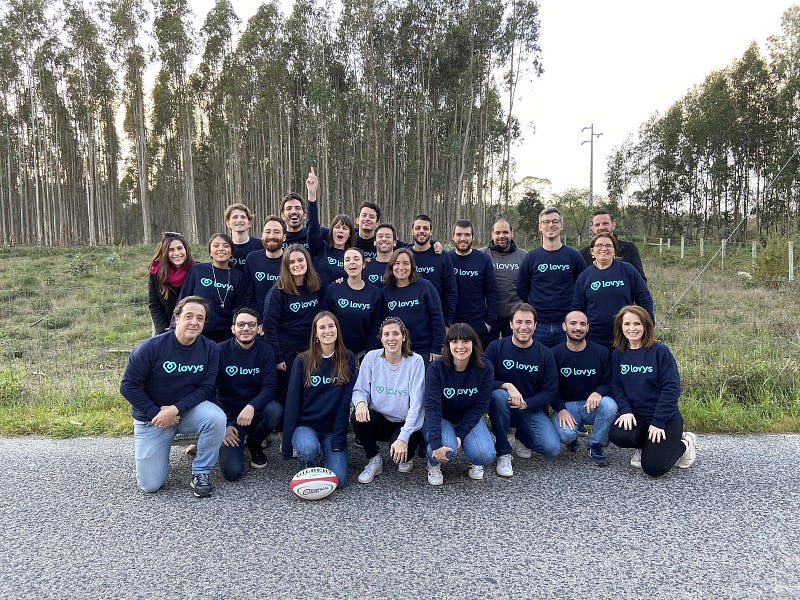Transitioning from studies, college life or even self-teaching to the “real” world of work is something almost everyone goes through, and experiences vary from person to person. Sometimes this transition is a shock for some, for others it’s like it wasn’t a transition at all. Regardless of how it goes, it’s a one-in-a-lifetime moment that is rarely repeated again in life, and it marks a new stage.
Cristóvão is 25 years old and has been working as a Junior Full-stack Developer at Lovys since 2019, his first job. We were curious about how this process was for him, so we asked him to share his testimonial with us.
Born in a digital world
With a degree in Computer Engineering and a passion for playing Counter-Strike, Cristóvão has always been connected to computers somehow. His parents bought him his first computer shortly after he was born, a Windows 95, and he went from playing games in it as a kid to exploring how it operated “behind the scenes” as a teenager. That’s how he describes his early passion for computers and coding.
I think the thing that most attracted me in programming was that basically anything that you can imagine, you can create. The possibilities are endless, and it mixes both logic and creativity, which are two things that I really like.
It was pretty obvious then that he wanted to be a Software Engineer, and that in order to do that, he would study Computer Engineering. Being extremely passionate about what he wanted to be, meant that he also looked for knowledge beyond his classes, so he spent a big part of his free time learning about the tech world from other sources.
Cristóvão also praises the teaching he received at Politécnico de Leiria, where he took his Bachelor in Computer Engineering and is currently taking a Master in Cybersecurity and Digital Forensics:
I have always enjoyed the process of creating and I think project-based learning gives a better preparation for the “real world”, even being in a very controlled environment, very different from the projects we work once we get out of college.

Cristóvão in his first year of college (left) and as a goalkeeper with his football team (right)
In his last semester of classes, Cristóvão chose to do a project for a multinational retail company that had their offices in Leiria. The person from that company who was responsible for guiding the project eventually got a new job a few months later and contacted Cristóvão with an interview proposal. That’s how, after a few interviews with several people, he landed his first job at Lovys.
I really liked the vision for the company that was presented to me and from the options that I had, I felt like Lovys was the one that excited me the most and it suited my objectives.
What college can’t prepare you for
For Cristóvão, landing his first job meant confronting a tough reality check. In the real context of work, things weren’t as controlled and measured as he had experienced in college. Every project he did while studying was very detailed and had very specific requirements of what he needed to implement, while in the reality of work these requirements aren’t always that clear and are actually prone to change at any moment. This makes communication extremely important, as he needs to make the right questions in order to clearly understand what’s expected. Besides, working in big teams wasn’t something college prepared him for either.
But the biggest challenge he faced was with pre-deployment preparations and the process it entailed. Cristóvão tells us that college didn’t teach him to worry about production incidents and making sure he identified potential problems before they were deployed to production. Working in Lovys taught him the importance of logging, metric alerts, quality assurance and proper documentation. As he himself puts it, “we do not realize the real importance until we start working with large complex systems.”
Landing in the “real” world: expectations vs reality
The hardest part of any new job, but especially any first job, is managing expectations. More often than not people don’t know what to expect, or when they do, they expect something that is not really aligned with reality. For Cristóvão, it was hard not having a clear idea of what was expected of him at first. This meant that he didn’t really have any expectations of what his job would be like.
And the tough reality was that his job wasn’t just about developing new features and fixing bugs, it was so much more than that. Programming wasn’t going to take center-stage above all else, planning was just as important in his job.
The planning phase is really important when we are developing software, good planning helps significantly decreasing the number of bugs that we might create and helps identifying potential problems before start implementing the functionality, which in the long term decreases the development cost, but is a time-consuming process that I really enjoy now but was not expecting to be such a crucial part of my job before I started working.

Cristóvão in a Lovys offsite
One thing about landing a job in a forward-thinking, young and innovative company means that your voice is actually heard and is not just one among many, which took Cristóvão by surprise. He was encouraged to express his ideas and give his input from his first day.
I was very lucky to find a great team that made me feel welcome from the first day and a company culture that is aligned with my objectives and beliefs. Since I started working at Lovys in 2019, the team has grown a lot and went through some changes in terms of structure, but I always felt like I belonged in the team. These kinds of changes are normal in a fast-growth company like Lovys, and being able to adapt quickly to changes is essential to work in a startup. Every change happens for a reason, and until now they have been really positive, which helps with the adaptation process.
A word to the wise — go beyond your tech skills
We’re ending this with Cristóvão’s own advice as someone who has recently entered the tech industry and has had his own experience transitioning from college to a company.
The best advice that I can give to someone that just entered the “professional world” is that you need to understand that no matter what tech stack you are using, this is just a set of tools used for a bigger purpose. What I mean is that understanding what you are building — why, who the users of the system are, what their needs are, which problem you and your team are trying to solve — is as important as understanding the tech stack very well.
Spend time learning everything that you can about the business sector that your company operates in, their partners, the competition. All of this will help you have a better understanding of how you can bring value to the company and also have a better input about everything you work on. Remember that tech is just one piece of the puzzle, a very core piece in most companies nowadays, but still just one piece, and all pieces need to fit well together in order to build a successful business. So you need to learn how to communicate efficiently with all sectors of a company and for this, it’s essential that you understand the business terms and also that you are capable of explaining complex technological concepts in simple terms — remember that not everyone in a company comes from a tech background.
Of course it is also very important to familiarize yourself with all tools that you use for your job. The better understanding you have of the system that your building and the tools that are being used for it, the more productive and effective you will be.
Always think and plan before you start working on something. I know it will feel like you are spending time that you will need for the implementation, but in most cases, it avoids lots of headaches in the future. And I cannot stress enough how important it is that you properly document, log and test everything that you do. It will pay off in the future, trust me.
Don’t be afraid to ask for help. If you are a junior developer, chances are that you are surrounded by people that are much more experienced than you. Use that to learn faster — you can absorb lots of knowledge from your colleagues if you pay attention to what they tell you. It is very important that you can solve problems by yourself, but almost everyone is glad to help when you feel stuck in something.
And finally, I really hope you enjoy what you do. For me, it’s a great feeling to see that Lovys has grown so much since I started working here, and I feel that my work contributed to this. So my advice is that you try to really know yourself, understand what motivates you and find a place that gives you the possibility to achieve your goals and learn as much as possible with the ones around you.
There’s no way we could have ended this better. Cristóvão has really laid out valuable advice and has given a glimpse of what it’s like getting a first job in the tech world. So, all that’s left for us to say is that if you’re ready to start exploring the possibilities, check out all the open positions Lovys is currently offering. Take the chance to explore our platform, chances are you’ll find something that catches your eye 😉
Matching You with Your Future!






0 Comments